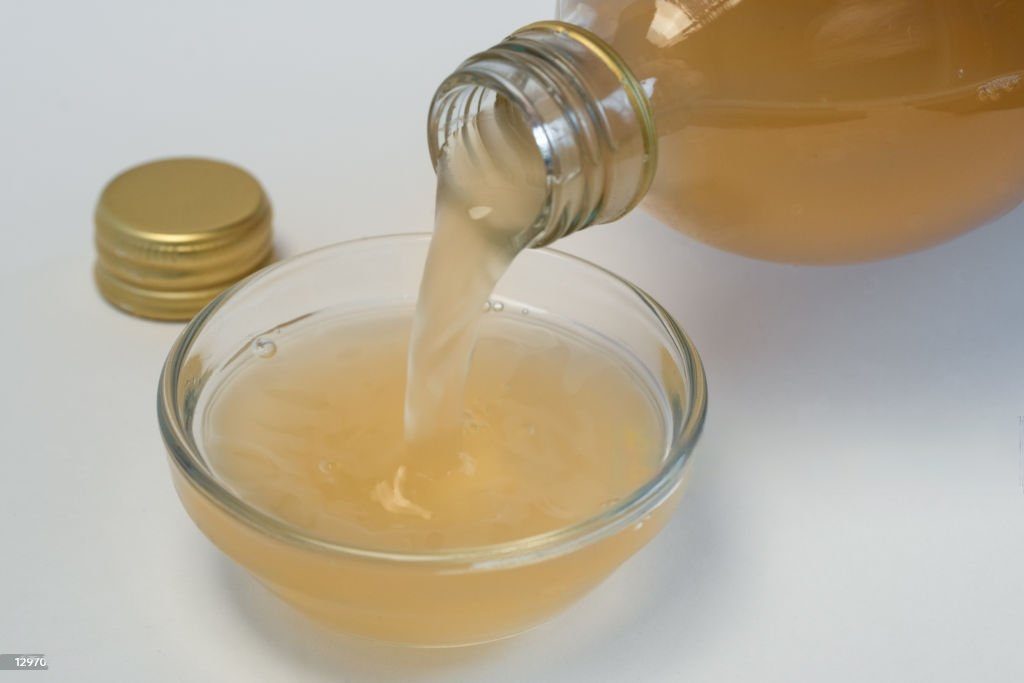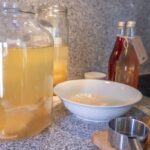If you’ve ever encountered persistent rust stains on your tools or outdoor furniture, you’re not alone. Interestingly, vinegar – a household staple- is an effective solution for removing stubborn rust.
Can Vinegar Clean Rust? Yes, vinegar can effectively clean rust from metal objects. To do this, create a vinegar solution by soaking the rusted item in white vinegar or apple cider vinegar for several hours or overnight. After soaking, scrub off any remaining rust with a brush or sponge, then rinse and thoroughly dry the object to prevent further corrosion. Adding salt to the vinegar can enhance its rust-removing power. Vinegar not only removes rust but also serves as a preventative measure against future corrosion when used properly.
This article will offer step-by-step guides to utilize vinegar optimally for rust removal and preventive measures to combat future corrosion. Stay tuned; you might just have the affordable, easy-to-implement solution right in your pantry!
Key Takeaways
- Vinegar can effectively remove rust from metal objects.
- Rust forms when iron or steel reacts with oxygen and water through a process called oxidation.
- Moisture, oxygen, chemicals, and salts are common causes of rust formation.
- Rust weakens metal structures and can cause discoloration and stains.
Understanding Rust and How it Forms
Rust forms through a chemical process, typically when iron or steel reacts with oxygen and water.

The chemical process of rust formation
Rust happens when iron reacts with oxygen and water. This process is called oxidation. The orange color you see is iron oxide, or rust. It breaks down the metal making it weak over time.
Rain, air, and salt speed up this reaction, causing more rust to form quickly.
Common causes of rust

Rust can be caused by several common factors. One of the main causes is moisture, especially when metal objects are exposed to water or high humidity for a long period of time. Oxygen also plays a role in rust formation, as it reacts with the metal to create iron oxide.
In addition, certain chemicals and salts can accelerate the rusting process by increasing the corrosive properties of moisture and oxygen. This includes substances like saltwater, acids, and pollution in the air.
It’s important to understand these causes so that you can take appropriate measures to prevent rust from forming on your metal objects.
Effects of rust on metal objects

Rust can have damaging effects on metal objects. It weakens the structure of the metal, making it more prone to breakage or collapse. Rust can also cause discoloration and stains, diminishing the appearance of the object.
In addition, rust particles can flake off and contaminate surrounding areas, leading to further corrosion. This is especially problematic for items like vehicles or machinery that need to function properly.
It’s important to address rust as soon as possible to prevent these negative effects and preserve the integrity of metal objects.
Using Vinegar to Remove Rust

To remove rust, you can create a vinegar solution and soak the rusted object before scrubbing off the rust.
Creating a vinegar solution

To create a vinegar solution for rust removal, you will need white vinegar or apple cider vinegar. These types of vinegar contain acetic acid, which is effective in dissolving rust.
You can start by pouring the vinegar into a container that is large enough to submerge the rusted object completely. Make sure that the object is fully immersed in the vinegar solution.
Let it soak for several hours or overnight to allow the acid to break down and loosen the rust. When you’re ready to remove the rust, take out the object from the solution and scrub off any remaining rust using a brush or sponge.
Soaking the rusted object

To remove rust from a rusty object, you can soak it in vinegar. Vinegar contains acetic acid, which helps dissolve the rust. First, create a vinegar solution by pouring enough vinegar to fully submerge the object in a container or bowl.
Then, place the rusty item into the vinegar and let it soak for several hours or overnight. The acetic acid will work to break down the rust on the surface of the object. After soaking, use a scrub brush or sponge to gently scrub away any remaining rust residue.
This method is effective for removing light to moderate rust from metal objects such as tools, utensils, or small pieces of furniture.
Scrubbing off the rust

To scrub off the rust, you will need a scrub brush or abrasive pad. After soaking the rusted object in vinegar for a few hours, take it out and start scrubbing. The combination of vinegar and salt would have loosened the rust, making it easier to remove.
Use firm pressure while scrubbing to ensure that all the rust is taken off. If there are any stubborn areas, you can apply more vinegar and let it soak for a little longer before scrubbing again.
Once all the rust has been removed, rinse the object with water and dry it thoroughly to prevent further corrosion.
Enhancing the Power of Vinegar with Salt

Adding salt to vinegar can increase its effectiveness in removing rust. Find out the steps for using this powerful mixture and say goodbye to stubborn rust stains!
How salt helps in removing rust

Salt helps in removing rust by acting as an abrasive agent. When salt is combined with vinegar, it creates a powerful solution that can dissolve and remove rust from metal surfaces.
The salt helps to scrub away the rust particles while the acidic properties of vinegar break down the rust. This combination makes it easier to loosen and remove stubborn rust stains.
To use this method, you simply need to create a mixture of equal parts vinegar and salt, apply it to the rusty area, let it sit for a few hours or overnight, and then scrub off the loosened rust using a brush or sponge.
Steps for using vinegar and salt for rust removal

To use vinegar and salt for rust removal, you will need to follow a few simple steps. First, create a mixture by combining equal parts of white vinegar and salt in a bowl or container.
Next, place the rusted object into the solution and let it soak for several hours or overnight. The vinegar’s acetic acid will react with the rust and help dissolve it. After soaking, take the object out of the solution and scrub off any remaining rust using a brush or sponge.
Rinse the object with water to remove any residue, then dry it thoroughly to prevent further corrosion. This method can be effective for removing light to moderate rust from various metal objects around your home.
When using vinegar and salt for rust removal, keep in mind that certain types of metals may react differently to this solution. It is always best to test on a small inconspicuous area first before treating larger surfaces or valuable items.
If necessary, you can repeat the process multiple times until all of the rust is gone. Remember that after removing the rust, it’s important to take preventive measures such as applying a protective coating or keeping metal objects dry to avoid future corrosion.
Other Methods for Removing Rust with Vinegar

In addition to using vinegar and salt, there are other effective methods for removing rust with vinegar. Find out how to create a baking soda and vinegar paste, as well as use oxalic acid for more stubborn rust stains.
Don’t miss these helpful tips for preventing future rust formation!
Baking soda and vinegar paste

You can also use baking soda and vinegar together to create a paste that helps remove rust. Baking soda is known for its abrasive properties, while vinegar provides the acidity needed to dissolve the rust.
To make the paste, mix equal parts baking soda and vinegar until it forms a thick consistency. Apply the paste directly onto the rusted surface and let it sit for a few hours. Then, scrub off the paste using a brush or sponge.
This method can be effective for smaller rust spots or objects with delicate surfaces that cannot handle harsher cleaners. Remember to rinse off any residue thoroughly once you’re done cleaning to prevent further corrosion.
Using oxalic acid

Oxalic acid is another effective method for removing rust. It is a strong acid that can dissolve rust quickly. To use oxalic acid, you will need to mix it with water according to the instructions on the packaging.
After creating the solution, you can soak the rusted object in it for several hours or overnight. Once soaked, you can scrub off the remaining rust using a brush or sponge. Oxalic acid works well on tough rust stains and can restore metal objects to their original condition.
Just remember to wear gloves and work in a well-ventilated area when using oxalic acid for safety reasons.
Tips for preventing rust
To prevent rust from forming on metal objects, there are a few simple tips you can follow. First, make sure to keep your metal items clean and dry. Moisture is one of the main causes of rust, so wiping down your objects after use can help prevent rust formation.
Secondly, you can apply a protective coating or paint to create a barrier between the metal and moisture in the air. This will protect the surface of the object from rusting. Lastly, storing your metal items in a dry area or using desiccants like silica gel packets can help absorb any excess moisture and prevent rust from developing.
By taking these preventative measures, you can keep your metal objects looking their best and avoid the hassle of dealing with rust removal later on.
SO, Can Vinegar Clean Rust?

In conclusion, vinegar is an effective and affordable option for removing rust from metal objects. By creating a vinegar solution and soaking the rusted item, you can easily scrub off the rust and restore the object’s appearance.
Adding salt to the vinegar can enhance its power in rust removal. Moreover, other methods like using baking soda or oxalic acid can also be effective alternatives. So next time you encounter rusty items, give vinegar a try as a natural rust remover that gets the job done!
FAQs
1. Can vinegar clean rust from metals?
Yes, vinegar can be used as a natural rust remover. It’s an acidic solution that helps in oxide removal and metal cleaning.
2. How does vinegar work to remove rust?
Vinegar has acid that works as a rust dissolver when applied directly on the rusty surface or soaked in it. This is because of the reaction between baking soda and vinegar.
3. Can I use just any type of vinegar for rust removal?
While all types have some level of acidity, white distilled vinegar usually works best for DIY rust removal and metal restoration.
4. What other items can be mixed with vinegar to enhance its rust-cleaning power?
A mixture of salt and vinegar creates an even more potent cleaning solution for treating stubborn spots of corrosion.
5. Does usingVinegar help prevent future Rust too?
Yes! Vinegar acts not only as a powerful dissolving agent but also as a good preventative measure against future corrosion, but remember to rinse off the solution after treatment so it doesn’t damage your removing item over time!.
6. Why should one consider using DIY methods like Vinegar for Cleaning Rust?
Using household items such as Vinegar not only provides easy access to quick solutions but also ensures an eco-friendly approach towards maintenance and conservation efforts.

As a dedicated mother and passionate software developer, she weaves her diverse experiences into captivating stories that inspire and engage readers. Emma's love for sustainable living and environmental consciousness permeates both her personal and professional life. When she's not immersed in the world of coding and software development, Emma can be found nurturing her family and tending to her thriving organic garden. Her commitment to sustainable practices extends to every aspect of her life, from repurposing household items to embracing eco-friendly technologies.










